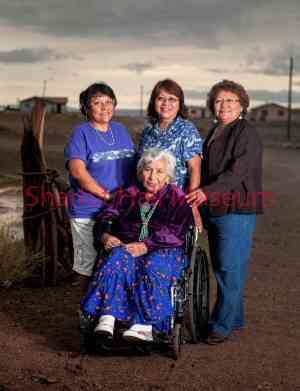Jean Mann & Her Daughters
details
David Young-Wolff Unknown 1100-2023-2213.jpg Days Past B&W 1100-2023-2213 1100-2023-2213 Digital Born <2x3 Media c. 2010 Reproduction rights are not available. Owned by another institution.Description
Jean Mann (seated) with daughters Lisa (Mann) Adams, Mindy (Mann) Nez, and Lolita (Mann) Paddock (standing) outside the family home in Cameron, Arizona.
Jean Huskon Mann, Navajo weaver, was born and raised near Shadow Mountain and Gray Mountain, Arizona. She married Henry Mann at age 17, and they raised eight children together in the Navajo Reservation community of Cameron until Henry died at age 36. As a single mother, Jean’s main source of income was weaving Navajo rugs at home, at the Grand Canyon and at Cameron Trading Post. She retired from weaving in her 70s. Now close to 90, she lives in a nursing home in Flagstaff.
Image Courtesy David Young-Wolff
Purchase
To purchase this image please click on the NOTIFY US button and we will contact you with details
The process for online purchase of usage rights to this digital image is under development. To order this image, CLICK HERE to send an email request for details. Refer to the ‘Usage Terms & Conditions’ page for specific information. A signed “Permission for Use” contract must be completed and returned. Written permission from Sharlot Hall Museum is required to publish, display, or reproduce in any form whatsoever, including all types of electronic media including, but not limited to online sources, websites, Facebook Twitter, or eBooks. Digital files of images, text, sound or audio/visual recordings, or moving images remain the property of Sharlot Hall Museum, and may not be copied, modified, redistributed, resold nor deposited with another institution. Sharlot Hall Museum reserves the right to refuse reproduction of any of its materials, and to impose such conditions as it may deem appropriate. For certain scenarios, the price for personal usage of the digital content is minimal; CLICK HERE to download the specific form for personal usage. For additional information, contact the Museum Library & Archives at 928-445-3122 ext. 14 or email: orderdesk@sharlot.org.




